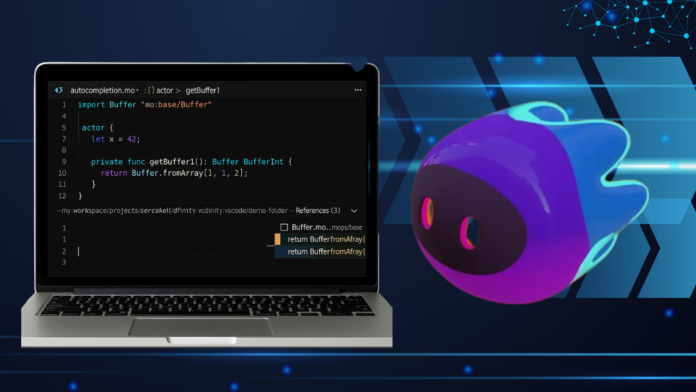It’s about to get a lot smoother to write smart contracts in Motoko, especially if you’re using Visual Studio Code. The team at Serokell has wrapped up its third grant with the Dfinity Foundation, and their latest round of improvements is focused entirely on making the Motoko VSCode Extension more efficient, responsive, and helpful for developers. From smart autocompletion to better error handling, this new release aims to take some friction out of the day-to-day coding grind for Internet Computer developers.
Autocompletion, that feature most developers take for granted until it goes missing, is now much sharper for Motoko users. The extension will recognise and suggest symbols from imported modules, helping you skip repetitive typing and avoid syntax mishaps. It’s a small detail on the surface, but it can make a major difference during long hours of coding, especially when hopping across multiple modules.
The update isn’t just cosmetic. The go-to-definition function, a key part of navigating large codebases, has received some bug fixes and enhancements. It now works more reliably and includes expanded support for module fields, classes, and actors. On top of that, you can now look up references much more effectively — a crucial capability for anyone maintaining or scaling a project written in Motoko.
Another improvement is something that seasoned developers will appreciate the most: smarter error messages. Instead of being met with vague syntax errors, users will now get a little extra help in the form of an example of valid code at the point of failure. This is particularly useful for those just starting with Motoko or learning functional programming more generally. It’s like having a mentor next to you, pointing out what could have gone wrong and giving you a nudge in the right direction — without the guesswork.
Serokell’s work on the moc compiler parser deserves some attention too. The parser now supports error recovery, meaning developers won’t be halted by one single syntax issue. Instead, the IDE will continue to catch other errors as you type, offering a broader and more immediate overview of what needs fixing. This helps avoid the situation where a single bracket or semicolon holds up your entire debug session.
They’ve borrowed techniques from their work on other smart contract compilers to make this happen, leaning on a fork of the ocaml-recovery-parser to implement the changes without breaking things that already work. This approach suggests Serokell is being cautious and pragmatic — building up functionality without throwing existing systems off balance.
Performance has been another focus. The extension now caches type information from the moc compiler, which can significantly speed up work on larger projects. Anyone working on big codebases knows the pain of sluggish IDEs; this fix should keep things moving faster. And to make sure future slowdowns are easier to catch and address, an automated benchmark has been added to the repository. That’s a neat behind-the-scenes touch that could improve the extension’s reliability over time.
All of these upgrades will be included in the next release of the VSCode extension for Motoko. The Internet Computer community has been gradually expanding its tooling, and this is a solid step forward. Tools like this extension matter more than they sometimes get credit for. A good editor experience can lower the barrier to entry, make it easier for new developers to learn the language, and support experienced teams building out serious projects.
Serokell’s involvement here is part of a broader trend of experienced engineering teams contributing to open infrastructure around Web3 and decentralised compute. Their steady involvement in the Motoko ecosystem — now on their third Dfinity grant — shows a long-term commitment to keeping the language usable, scalable, and practical. This is especially relevant as the ecosystem grows and begins attracting more developers from traditional backgrounds who expect robust tooling out of the box.
Motoko was always pitched as a language optimised for the Internet Computer, aiming to balance performance and safety with a fairly accessible syntax. But no language can thrive without good developer experience, and a modern, capable VSCode extension is a big part of that. This latest upgrade makes the development process feel more modern and reliable — and maybe even a bit less frustrating during late-night coding sessions.
Even small things, like clearer error messages and better autocomplete, can change the pace and confidence of writing code. With these updates, Serokell’s latest round of improvements feels timely, especially as the Motoko developer community matures and projects become more ambitious.
This release is a good reminder that open-source infrastructure doesn’t need to be flashy to be valuable. Quiet improvements that make a tool more usable, readable, and responsive tend to have a real impact, especially when they build on what’s already familiar to the community. The new features are straightforward, practical, and focused on things developers will notice right away.
For anyone already building on the Internet Computer, or considering Motoko for their next project, it’s worth trying out the updated extension when it drops. Writing smart contracts isn’t always easy, but working with good tools can make it feel less like a chore. This VSCode update won’t write the code for you, but it might just make writing it a bit more enjoyable.
The next release will be available soon — watch out for it on the usual channels.


